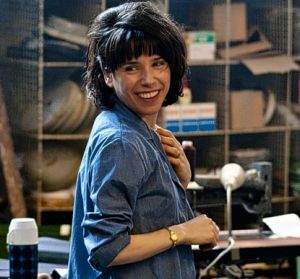Howard Marks was a pothead Errol Flynn, living a life of remarkable escapades and hair's-breadth escapes. A Welsh working-class Oxford graduate in nuclear physics and philosophy, he’d be fascinating company even if he wasn’t once the world’s most successful dope smuggler, and an associate of the IRA, the CIA, the Mob and MI6. His autobiography, Mr Nice, has let Marks earn a living reminiscing about it ever since. But Bernard Rose’s adaptation casts inadvertent doubt on such cult heroism. Marks’s life here seems somehow inconsequential.

The most surreal scene in this searing, adrenaline rush of a documentary about a US platoon in Afghanistan is the sight of three soldiers dancing madly in their bunker to "Touch Me, I Want to Feel Your Body" on an iPod.

A Town Called Panic is a charming, giddily funny dose of anarchy from a pair of benign Belgian punks, Stéphane Aubier and Vincent Patar. The first stop-motion animation to be selected at Cannes, it stars Horse, Cowboy and Indian, dysfunctional plastic toy housemates in a papier-mâché world. UK viewers will recognise the style from the Cravendale milk TV ads. Those mad cows only hint at the bizarre pleasures here.

The long-delayed sequel has earned no more than a small, insignificant footnote in movie history. Psycho II, Gregory’s Two Girls and Texasville, to name only three disparate examples, were all superfluous post-scriptums to much venerated, much earlier films. There is at least a pretext for another trip to Wall Street. Since Gordon Gekko last blew the fumes of his fat Havana in your face, money has learnt to talk louder than ever.

He’s six feet under from the start. Paul Conroy is in a wooden coffin a dead-man’s distance beneath Iraqi soil when the flick of his Zippo illuminates him in the darkness where we’ve heard thudding and screaming. His oxygen, like the film, will last 90 minutes. A mobile phone connects him to his kidnapper, family and would-be rescuers. It’s the ultimate locked-room mystery, told from inside the room. But Buried is a curiously unclaustrophobic experience, instead opting to skip down sprightly, satirical tracks.

It’s all too tempting to lambast Takers as merely a collection of traditional clichés from the heist/cop/buddy genres. Over here is Matt Dillon as Jack Welles, a burned-out LAPD detective with a permanent hangover and a broken marriage – stop me if you’ve heard this one - who can’t cope very well with raising his young daughter. He’s riding around with his eager young partner, Eddie Hatcher (Jay Hernandez), who still seems to have his whole career before him.
It’s all too tempting to lambast Takers as merely a collection of traditional clichés from the heist/cop/buddy genres. Over here is Matt Dillon as Jack Welles, a burned-out LAPD detective with a permanent hangover and a broken marriage – stop me if you’ve heard this one - who can’t cope very well with raising his young daughter. He’s riding around with his eager young partner, Eddie Hatcher (Jay Hernandez), who still seems to have his whole career before him.

Nigel Cole’s bright and breezy film opens with news footage and advertising reels about the American car giant Ford, which in 1968 had 24,000 men working at its Dagenham plant in Essex and only 187 women. It may have been the decade of the Beatles, the Rolling Stones and David Hockney - all vibrant colours and youthful energy - but the Swinging Sixties are far removed from the gritty reality of these low-paid workers’ lives.
The 187 women work in appalling conditions in their separate part of the factory - freezing and with a leaking roof in winter, baking hot in summer - as they stitch together the seat covers for the new Cortina, which is soon to be rolled off the Dagenham production line, where many of their husbands and sons also work. The women are agitating for a pay rise and are led by Rita (Sally Hawkins), an unassuming young mother of two who is voted in as their spokeswoman.
They go on strike and soon the dispute is widened into one about equal pay - the machinists were being paid 87 per cent of the rate paid to unskilled men and 80 per cent of the rate paid to semi-skilled. What they do is deemed by Ford as unskilled work, but which looks pretty damned skilled to me - “Put those together and make a car-seat cover,” Rita says as she throws a wad of different-shaped strips of plastic at a roomful of Ford managers, who all look mystified as to how the material might end up as the finished product.
The strike - the first by women since the Bryant & May match girls of 1888 - lasted three weeks, closed the factory and became a major news item. The Secretary of State for employment, Barbara Castle, met the women, who subsequently agreed to go back to work after being offered 92 per cent of the men's rate. It was not until 1984, though, and after another strike, that the women were regraded as semi-skilled, but their 1968 action led directly to the introduction of the Equal Pay Act in 1970.
Cole, with a script by William Ivory from a story suggested by the film’s producer, Stephen Woolley, describes a vital part of Britain’s political history with a lot of humour - there are moments that feel pure Ealing comedy or even Carry On - and by telling the human stories of the women. This isn’t a docudrama, however, as the characters are composites of the actual women, although we do get to see them as they are today as the final credits roll.
Rita and her colleagues confound the men around them; they are not political, but became politicised by the rightness of their demands and when they woke up to the shocking sexism and male chauvinism of the time. There’s a telling exchange between Rita and her husband, Eddie, which describes both their domestic set-up and a wider social reality. After a few weeks in which Rita has been increasingly absent fighting the cause, Eddie is down to his last shirt and, exasperated as she rushes off to another strike meeting, he tells her that she should be grateful that he doesn’t hit her, go out drinking every night or screw other women. “I want that as a right, not a privilege,” she tells him.
 The men in Made in Dagenham mostly come off badly - the conniving union bosses, the patronising Ford management in the UK and America, and the women’s own menfolk who conveniently forget that the 187 had walked out in sympathy when the men went on strike previously, but who now think only of their lost wages when the factory shuts down production. But Bob Hoskins, as the women’s supportive shop steward, and Daniel Mays, as the sweet-natured Eddie, are sympathetically drawn and played.
The men in Made in Dagenham mostly come off badly - the conniving union bosses, the patronising Ford management in the UK and America, and the women’s own menfolk who conveniently forget that the 187 had walked out in sympathy when the men went on strike previously, but who now think only of their lost wages when the factory shuts down production. But Bob Hoskins, as the women’s supportive shop steward, and Daniel Mays, as the sweet-natured Eddie, are sympathetically drawn and played.
Hawkins (pictured above) is tremendous as Rita, an undereducated woman finding her voice, while Rosamund Pike almost steals the show with a wonderfully restrained performance as the trophy wife of a Ford executive. She may have a first in history from Cambridge, but she is dismissed to the kitchen when he wants to talk business with his boss. Andrea Riseborough and Geraldine James give great support as other factory women in the forefront of the battle, and Jaime Winstone does a nice turn as a young woman conflicted between supporting her mates and breaking out of the working-class mould by becoming a model.
Miranda Richardson, meanwhile, is clearly having great fun as Barbara Castle, but her character doesn’t quite ring true as - bizarrely, to my mind - Cole presents her more as a manipulative politician who uses the women’s dispute for her own ends, rather than the canny and courageous fighter for equal rights that she was. It’s the one minus point in an otherwise warm-hearted and thoroughly enjoyable film.
THE BEST OF ROSAMUND PIKE
 A United Kingdom. Love, race and power politics under African skies
A United Kingdom. Love, race and power politics under African skies
Barney's Version. Pike plays the third wife as novelist Mordecai Richler makes a mostly welcome return to the screen
Gone Girl. Pike compels in unfilmable book triumphantly brought to the screen by David Fincher
Jack Reacher. Pike survives the famous curse of Cruise
Women in Love. A BBC Four adaptation starring Pike and Rachael Stirling does not get over The Rainbow
PLUS ONE TURKEY
Thunderbirds Are Go. Pike voicing Lady Penelope cannot save the day for ITV reboot
Overleaf: watch the Made in Dagenham trailer

The words “starring Robin Williams” hardly inspire film-goers with confidence these days. After a career that includes the dramatic highlights of Good Morning Vietnam, The Fisher King and Dead Poets Society, and the amenable comedy of Mrs Doubtfire, he has more recently made a slew of films over which it would be kind to draw a veil. But he’s back on terrific form in World’s Greatest Dad, one of the most original and funny comedies released this year.

The constant strobing lights us white like we’re watching an Atom bomb test. From its garish credit sequence to the somehow inevitable vagina’s view of a penetrating penis, Enter the Void attempts assaultive cinema. You’d expect no less from Gaspar Noé, whose previous film Irreversible (2002) menaced audiences with the prospect of Monica Bellucci’s character’s real-time rape half-way through. The director is an idealist as much as a provocateur, as this long trip through the post-death visions of a murdered young American in Tokyo proves.

Welcome to Charlestown, a Boston neighbourhood of just one square mile that has produced more bank robbers than anywhere else in America. Here crime is a “trade” passed down from father to son, and the height of ambition is to serve your inevitable jail time “like a man”.

